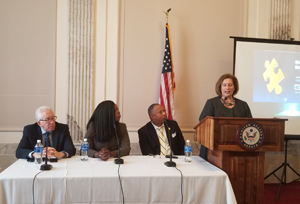 Although all educators acknowledge the critical importance of literacy for student success, schools have a long way to go in implementing sustained, high-quality literacy programs. According to Education Dive, one common barrier is that principals do not have the content area expertise to become literacy leaders. Another is that they do not have leadership skills to guide a schoolwide literacy improvement effort.
Although all educators acknowledge the critical importance of literacy for student success, schools have a long way to go in implementing sustained, high-quality literacy programs. According to Education Dive, one common barrier is that principals do not have the content area expertise to become literacy leaders. Another is that they do not have leadership skills to guide a schoolwide literacy improvement effort.
Teachers are only as strong as the school’s leadership—without adequate scaffolding and support, even the most competent and ambitious educators will find it difficult—if not impossible—to bring about meaningful change.
The House spending proposal for education for the next budget year would cut $2.4 billion in funding for the Supporting Effective Instruction grant program, also known as Title II—which provides federal funds to recruit, retain, and train high-quality teachers, principals, and school leaders.
Last Wednesday, the International Literacy Association (ILA) and the National Association of Secondary School Principals (NASSP) cosponsored a briefing titled “Improving Student Literacy: Leadership Needed at Every Level” in Washington, DC. The briefing brought together a group of literacy leaders, policymakers, advocates, and educators who spoke to Congressional staffers from key Senate and House education committees about the critical importance of effective leadership at all levels.
Empowering teachers to become real leaders
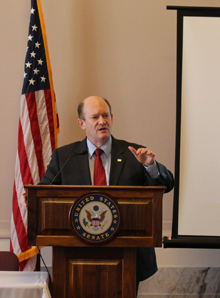 Dan Mangan, ILA’s director of public affairs, welcomed guests and introduced Senator Chris Coons (D-DE), who set the stage with remarks touting the importance of teacher leadership. He attributed high teacher turnover rates to a lack of administrative support, professional learning opportunities, and decision-making input.
Dan Mangan, ILA’s director of public affairs, welcomed guests and introduced Senator Chris Coons (D-DE), who set the stage with remarks touting the importance of teacher leadership. He attributed high teacher turnover rates to a lack of administrative support, professional learning opportunities, and decision-making input.
“We have to find better ways for teachers to become real leaders,” said Coons. “How many of our students struggle in school where they don’t have the teaching resources they deserve and where teachers struggle to find leadership and growth opportunities for themselves?”
For most teachers, said Coons, the only pathway to advancement is by becoming an administrator. He believes that teachers need opportunities to become leaders without having to leave the classroom.
Coons also cited the Teachers Are Leaders Act, a bipartisan bill he introduced with Joni Ernst (R-IA), Chuck Grassley (R-IA), Jack Reed (D-RI). If passed, the act would leverage the expertise of teacher preparation programs to design and implement new teacher leader roles.
“We’re making sure we invest in the teachers who instruct, train, and are critical role models to our children,” said Coons. “Research shows that when we empower teachers to lead, our schools and our students are stronger.”
Behind every effective teacher is an effective principal
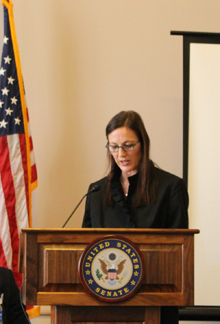 Kelly Pollitt, chief advocacy officer of the National School Boards Association, opened the panel presentation in her role as moderator. She introduced the three key speakers—a district superintendent, a middle school principal, and a principal educator—who would collectively impart the “magic ingredients” of successful literacy leadership.
Kelly Pollitt, chief advocacy officer of the National School Boards Association, opened the panel presentation in her role as moderator. She introduced the three key speakers—a district superintendent, a middle school principal, and a principal educator—who would collectively impart the “magic ingredients” of successful literacy leadership.
Pollitt prefaced with an urgent reminder that now, more than ever, school leadership can affect student achievement. She said it’s critically important that literacy continues to be a national priority.
“We know that the first and most important school-based factor that influences student learning is the teacher,” she said. “Behind every effective teacher is an effective principal.”
Literacy = the vaccine for poverty
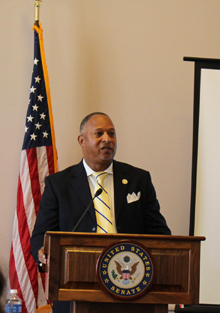 Pollitt first introduced ILA Board member Stephen Peters, the CEO of The Peters Group and founder of the Gentlemen’s and Ladies Club programs, which provide mentorship opportunities for at-risk and honor students throughout the United States
Pollitt first introduced ILA Board member Stephen Peters, the CEO of The Peters Group and founder of the Gentlemen’s and Ladies Club programs, which provide mentorship opportunities for at-risk and honor students throughout the United States
When Peters was a child, his father always told him that “literacy is the vaccine for poverty.” Peters continues to embrace this phrase today in his role as superintendent of Laurens County 55 School District.
Peters shared some secrets to his success in cultivating a schoolwide culture of literacy, such as increasing classroom reading time, mandating take-home reading, and implementing regular professional development.
Family and community engagement is another key feature of his approach—on the first day of school each year, faculty from Laurens County 55 School District go door-to-door into local neighborhoods, introducing themselves to parents and students.
For teachers to teach at their best and for students to learn at the highest level, principals need to define and promote high expectations, according to Peters. He believes superintendents play a critical role in cultivating leadership skills among all teachers and faculty.
Breaking the cycle
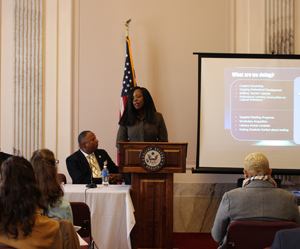 Doris Lee, founder and principal of Village Academy, an New York City middle school in Far Rockaway that’s part of a major program called the Middle School Quality Initiative (MSQI), has also focused her efforts on professional learning. Teachers at Village Academy collaborate in their respective subject areas and grade teams to develop instructional plans, to engage in professional learning communities, and to address the diverse social and emotional needs of students.
Doris Lee, founder and principal of Village Academy, an New York City middle school in Far Rockaway that’s part of a major program called the Middle School Quality Initiative (MSQI), has also focused her efforts on professional learning. Teachers at Village Academy collaborate in their respective subject areas and grade teams to develop instructional plans, to engage in professional learning communities, and to address the diverse social and emotional needs of students.
“As our student population changes, the learning has to continue,” said Lee. “We need ongoing support to ensure that we can meet the needs of every single child.”
Lee said this model has been proven to improve student learning outcomes; from 2016 to 2017, Village Academy saw a 19% increase in performance on state standardized English language arts test scores and, more important, a sustained baseline over a measure period when the New York City average declined significantly.
Moreover, Lee has succeeded in closing achievement gaps—an accomplishment that would have been impossible without strong teacher education, she said.
“Poverty is cyclical, and literacy can break the cycle,” said Lee. “But educators need training to be effective.”
Preparing principals to close achievement gaps
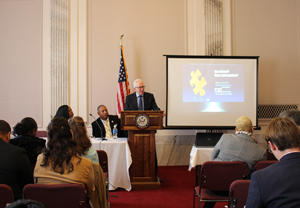 ILA’s William Teale, professor in the Literacy, Language & Culture Program and University Scholar at the University of Illinois at Chicago (UIC), presented on Stanford University’s recently published study, which demonstrates the outperformance of Chicago Public Schools against the national average.
ILA’s William Teale, professor in the Literacy, Language & Culture Program and University Scholar at the University of Illinois at Chicago (UIC), presented on Stanford University’s recently published study, which demonstrates the outperformance of Chicago Public Schools against the national average.
Another local study shows that percentages of freshman on-track, annual achievement gains, attendance and graduation rates were significantly higher in schools whose principals were graduates of UIC’s principal preparation program, which include a course on literacy leadership.
Teale pointed to this research as evidence that greater success is achieved when teachers are backed by strong leaders.
“You are never going to learn to be a good principal by sitting in a classroom and reading,” said Teale. “You need to get out there and do things in schools.”
The key to schoolwide success
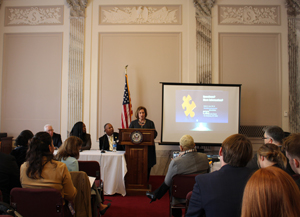 JoAnn Bartoletti, executive director of NASSP, closed with a call to action, reiterating the critical importance of restoring Title II funding under the Every Student Succeeds Act.
JoAnn Bartoletti, executive director of NASSP, closed with a call to action, reiterating the critical importance of restoring Title II funding under the Every Student Succeeds Act.
She said that the key to schoolwide success is common ownership over a shared vision and set of goals. She believes that every educator has a stake in—and a responsibility to—support literacy education, as every learning opportunity relies on literacy skills.
“Literacy is the great gateway to the critical and creative thinking that has always been the hallmark of our nation’s progress.”
Alina O'Donnell is the editor of Literacy Daily.